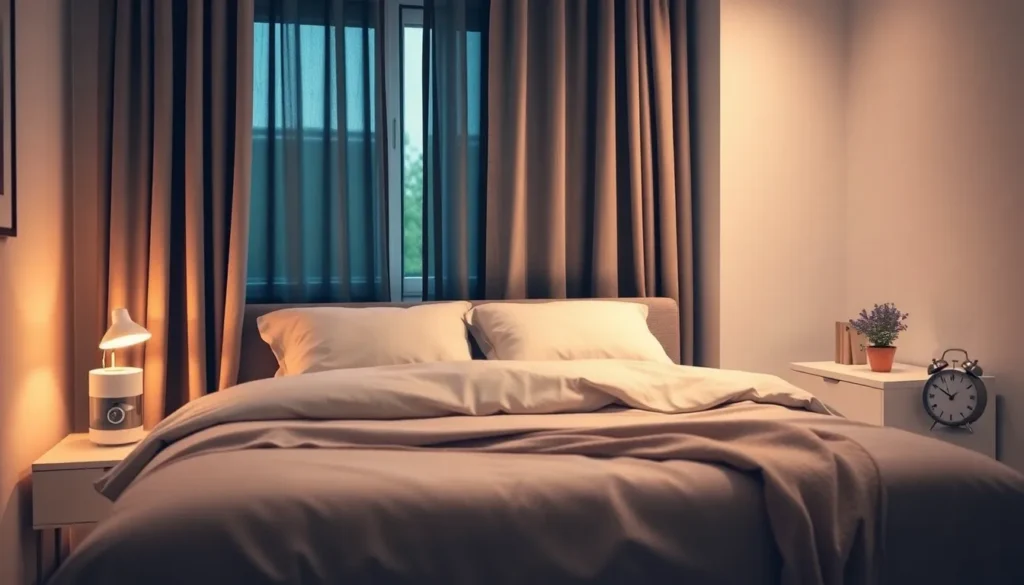Picture this: You’re sprawled out in bed, blissfully unaware of the chaos around you. In your dreams, you’re soaring with the eagles or sipping coffee on a sunny beach. Sounds perfect, right? But what if I told you that achieving such serene slumber isn’t just a matter of luck? It all hinges on the concept of quiet sleep, a crucial element that significantly impacts overall wellbeing. Let’s jump into the nitty-gritty of quiet sleep, uncover its benefits, and, most importantly, learn how one can cultivate this elusive state of rest.
Table of Contents
ToggleWhat Is Quiet Sleep?

Quiet sleep, often referred to as deep sleep, is a critical phase of the sleep cycle where the body experiences restorative processes. Understanding what truly occurs during this phase sets the groundwork for appreciating its significance.
The Stages of Sleep
Sleep is not a one-size-fits-all experience: it consists of several stages that cycle throughout the night. Mainly, sleep is categorized into two significant types: Non-REM (NREM) and REM sleep. Within NREM, there are three stages:
- Stage 1: Light sleep, where one can be easily awakened.
- Stage 2: Deeper sleep, characterized by sleep spindles and reduced body temperature.
- Stage 3: This is where the magic happens, quiet or deep sleep. Here, bodily functions slow to allow recovery and growth. In this stage, the brain produces delta waves, and waking up feels nearly impossible.
Characteristics of Quiet Sleep
Characterized by a decrease in heart rate and breathing, quiet sleep doesn’t just feel great: it serves numerous functions. Muscles relax, and metabolism slows down, creating the ideal backdrop for recovery and repair. Also, this phase is crucial for memory consolidation. You might not be aware, but your brain is working hard to solidify new information, making those late-night cramming sessions worth it, at least if you can achieve quality quiet sleep.
Benefits of Quiet Sleep
The advantages of quiet sleep extend far beyond simply feeling refreshed in the morning. Its impact resonates through our mental and physical health, helping individuals thrive in their daily lives.
Mental Health Benefits
Quiet sleep is like a mental reset button. It can drastically improve mood regulation and decrease feelings of anxiety. During this restorative sleep phase, the brain processes emotional experiences, allowing individuals to wake up feeling emotionally balanced and resilient. So, for anyone struggling with stress or mental fatigue, the path to feeling better might just be a few solid nights of quiet sleep away.
Physical Health Benefits
From muscle recovery to immune function, quiet sleep contributes significantly to physical health. During deep sleep, the body releases growth hormones, encouraging tissue growth and repair. Besides, proper quiet sleep can lower the risk for numerous health conditions such as obesity, diabetes, and cardiovascular diseases. Who wouldn’t want to stack the odds in their favor when it comes to health?
How to Achieve Quiet Sleep
Knowing the benefits is just one piece of the puzzle. The real challenge lies in figuring out how to achieve that deep, quiet sleep consistently.
Creating a Sleep-Conducive Environment
First things first: the environment plays a monumental role. Creating a dark, cool, and quiet bedroom can greatly enhance the likelihood of achieving deep sleep. Consider blackout curtains, earplugs, or a white noise machine. Plants? A cozy mattress? All these elements contribute to designing the perfect sleep sanctuary.
Establishing a Sleep Routine
Next, establishing a consistent sleep routine signals the body that it’s time to wind down. Going to bed and waking up at the same time every day helps regulate the body’s internal clock, making it easier to fall into that peaceful state of quiet sleep. Think of it as programming for your body. Over time, this routine can condition your mind and body to know exactly when to ease into restorative sleep.
Mindfulness and Relaxation Techniques
Even in the pursuit of quiet sleep, disruptions are bound to happen. Luckily, mindfulness and relaxation techniques can help minimize these interruptions.
Tips for Reducing Sleep Disruptors
Consider incorporating meditation, yoga, or reading as part of the wind-down routine. These calming practices help clear the mind, reducing performance anxiety associated with the next day. Avoiding screens at least 30 minutes before sleep also makes a difference. The blue light emitted from phones and laptops can interfere with melatonin production, making it harder to achieve that coveted quiet sleep.
Limitations of Quiet Sleep
Though quiet sleep offers a plethora of benefits, it’s essential to discuss its limitations. First, it’s not a cure-all. Even with perfect sleep hygiene, occasional sleep disturbances can occur. Factors such as stress, diet, and age can influence sleep quality and quantity. While striving for quiet sleep is a noble pursuit, it’s crucial to keep in mind that individual experiences will vary.




